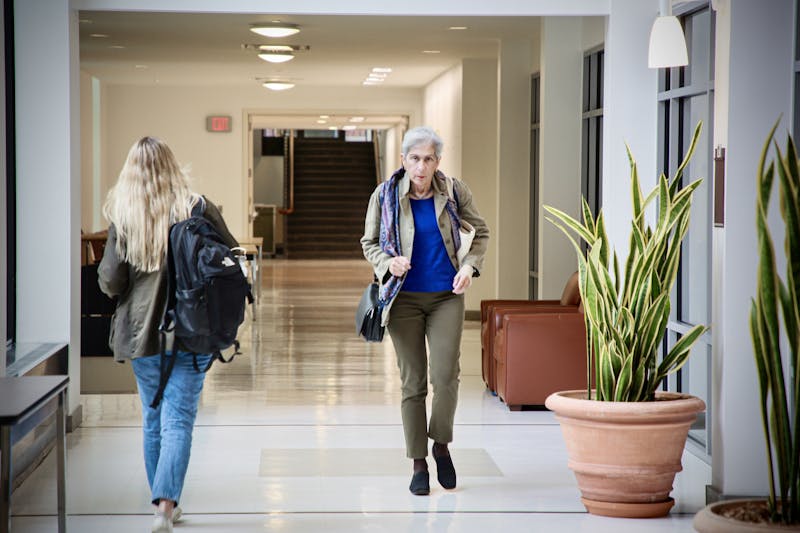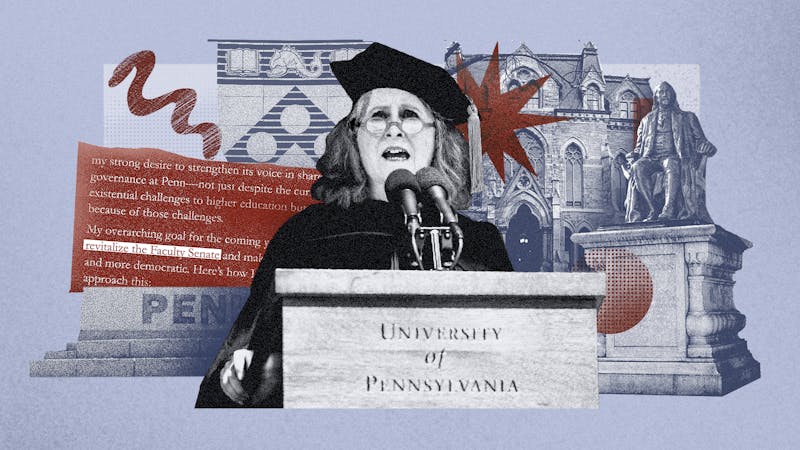When I was in high school, legend had it that the number of self-identified Republicans was the same as the number of Communists: three.
Everyone else, of course, was a Democrat.
I'm not sure how scientific this poll was - or if it existed at all - but it gives you a look into the liberal bubble where I grew up in Washington, DC. It was Democrats, Democrats, Democrats, all the time.
When I got to Penn, I thought I had run into some real diversity when there was a guy who voted for Bush on my freshman hall.
We would sit around in our tiny rooms in the Quad, debating sweeping issues like "the economy" and "whether or not the war in Iraq is good." Confronted with a real live Republican for one of the first times, I was a crusader for liberal politics.
I tried, but I never did convince him to vote for Kerry. (I also like to think I've learned to be a little more polite to my conservative friends.)
That guy on my freshman hall, as we all know, was in the minority at Penn. He did make a big impression on me, but his vote didn't make a big difference on campus - an overwhelmingly Democratic school in an overwhelmingly Democratic city.
What's easy for us at Penn to forget, however, is that his vote did make a big difference where it mattered.
We Democrats can get complacent at a place like this one, where students voted in droves for Kerry in 2004 and for Bob Casey in 2006. The Philadelphia mayoral election will essentially be decided during the Democratic primary in May because the city would never elect a Republican.
Even the conservatives at Penn are usually of the Wharton variety, business-minded people without a socially conservative agenda. We're lucky to have few run-ins with the kind of right-wingers that run our country.
Reading the paper the other day, I got a stark reminder that things aren't so good for college-age liberals elsewhere in the U.S.
According to a New York Times/CBS News poll that came out last month, people our age are more conservative than ever, a fact that may have devastating consequences for our country in 2008.
For example, 48 percent of Americans 18-29 years old said the United States was right to take military action against Iraq, while only 45 percent said we should have stayed away.
Forty percent of Americans in our age group approved of the way President Bush is doing his job.
And somehow, almost 50 percent of us thought the United States is going to succeed in Iraq.
The poll also showed that we seem to be much bigger Bush fans than Americans age 65 and older, 62 percent of whom said they did not approve of the president's performance.
"It's because of life experience," 73-year old Jimmie Powell told pollsters. Powell is a retired bartender and factory worker from Oklahoma.
"I don't think younger people really know a whole lot about anything," he continued. "They don't care because there is no draft. If there were a draft, we'd finally have the revolution we need."
If this many of our peers care about right-wing issues, young progressives need to wake up and start talking.
I'm not sure I agree with Mr. Powell about young people not knowing anything. But Powell's right about one thing: it's people our age dying in Iraq.
Just yesterday, 171 people died in an explosion in Baghdad. There is no demographic information available yet, but I'll bet a good number of them were just as old as I am.
It's people our age who will shoulder our parents' Social Security debt. It's people our age who will deal with a warmer planet and a crippling dependence on oil. It's people our age who will have expensive student loans to pay off.
And it's people our age who should be the very ones demanding better from our nation.
It's easy for liberals to sit back and relax here at Penn. We're miles away from explosions in Baghdad and debates in Washington, making it easy for us to assume that everyone thinks like we do.
But our generation doesn't have to give in to the Bush agenda and vote the way these pollsters have come to expect us to.
Let's prove them wrong in 2008.
Mara Gordon is a College junior from Washington, D.C. Her e-mail address is gordon@dailypennsylvanian.com. Flash Gordon appears on Thursdays.
The Daily Pennsylvanian is an independent, student-run newspaper. Please consider making a donation to support the coverage that shapes the University. Your generosity ensures a future of strong journalism at Penn.
DonatePlease note All comments are eligible for publication in The Daily Pennsylvanian.







